Nine Americans and a retired Croatian consistently put their pieces on the wrong squares at the start of each round. Nine times, they tried to get it right, and nine times, they ended up having to play from unusual starting positions with complicated castling rules instead.
Wait! We are being told that they agreed to play like this, and in fact were playing a variant known as Chess 960 meant to eliminate opening preparation. Which makes sense, since that retired Croatian guy is better known as 13th world champion Garry Kasparov!
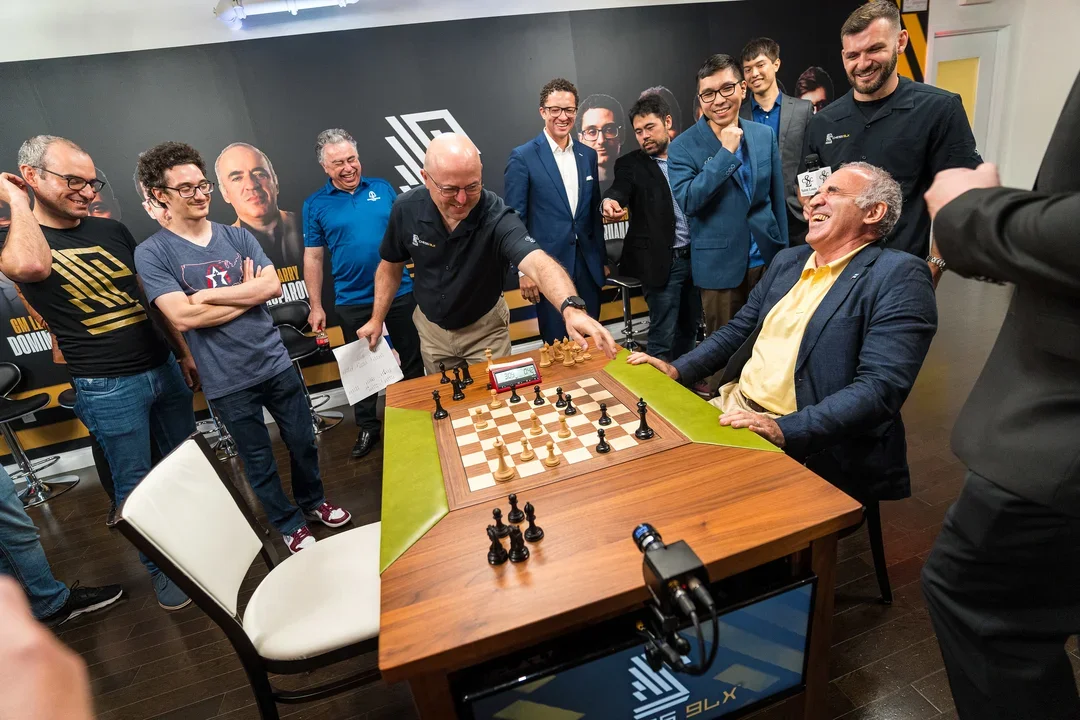
The 2023 Champions Showdown Chess 9LX took place from September 8 through 10 at the Saint Louis Chess Club (SLCC) for nine rounds of Chess 960. Despite Kasparov leading the event ahead of seven active players after the first day, stamina and time pressure got the best of him as the days went out.

When the dust settled, it was GM Samuel Sevian finishing with a 7/9 score that was a full point ahead of a field that included GMs Fabiano Caruana, Hikaru Nakamura, Wesley So, Leinier Dominguez, and Levon Aronian. Also joining the fun were GMs Jeffrey Xiong, Ray Robson, and Sam Shankland. Shankland, in particular, had an excellent event, finishing in a three-way tie for second with 6/9 and wins over Kasparov, Caruana, and Nakamura.
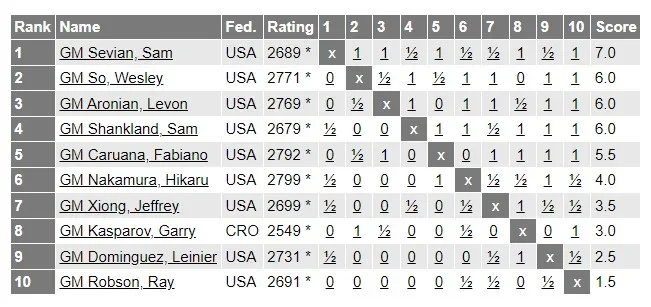
Right from the first round, the games got off to an eventful start with Kasparov playing former Chess 960 world champion GM Wesley So. Note that, for games played in round one, quirks of the variant are preventing them from embedding properly, so please follow links to see the full game. For other games, they will be embedded as normal.
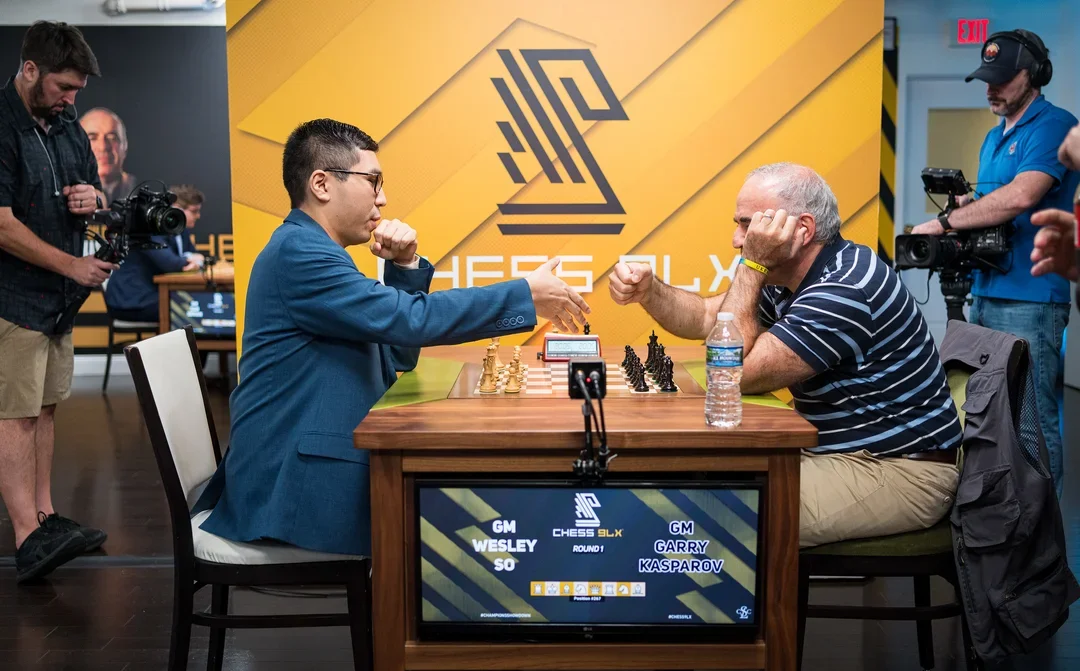
An old saying goes that everyone’s pieces move the same, except for Kasparov’s. This was on display against So, as Kasparov’s weakened king position was of no bother. But one weakening of the light squares around So’s king and Kasparov was ready to pounce. See for yourself here, with the position right before So's fatal 22. c4??.

Another key encounter was between the Armenian-born GM Levon Aronian and the Armenian-American Sevian. Despite taking place in round one, this ended up being the game that decided the tournament, as Sevian’s eleventh-hour victory from a drawn position (that was previously a lost position) ended up being the difference-maker between Sevian and Aronian, who finished along with Shankland and So a point behind the winner. This miscalculation on Aronian’s part had less to do with the starting position and more to do with the clock, to be sure.
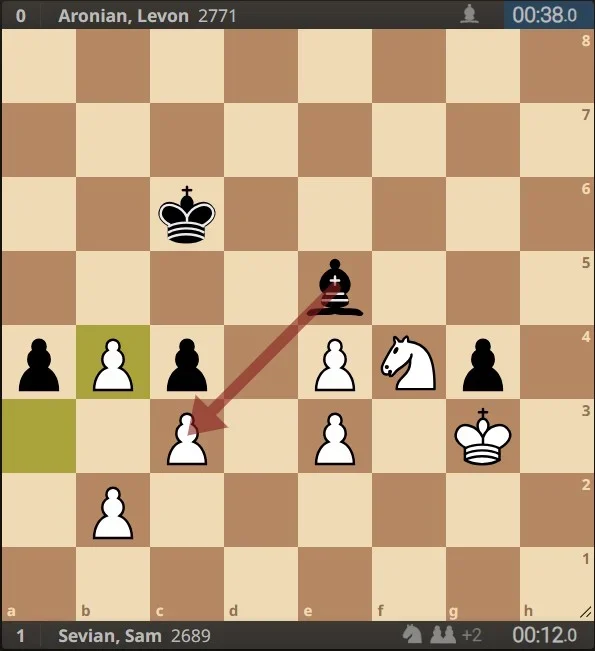
Another highlight from the first day included the second-round draw between Kasparov and Nakamura. Nakamura was the only player Kasparov was unable to topple on day one, although it was Nakamura who had a near-miss in the endgame. Can you find an improvement for Black over the text move?
Kasparov’s fortunes started to turn as he squandered a promising position in his fifth round game against Xiong. This game highlights the depths of Chess 960 and why it has captured the interest of so many of the world’s elite players. It’s not just that the pieces start on different squares, but that this wrinkle calls into question whether “basic principles” are always still in effect in the same way. In the position below, Kasparov has a favorable position after 18 moves, and there’s no reason not to blow things up with 19. h4.
Instead, Kasparov brings his knight towards the center with Nf1-d2-f3 and also castles (which involves moving the king and rook to the squares they would be on after castling in Chess 1). As soon as he’s centralized his pieces, completing development in this way, his position has went from better to equal to losing, thanks to Black’s stunning 21. … h5!, winning the e-pawn, the center and, shortly thereafter, the game.
Another amusing position occurred during Sevian’s crucial seventh-round win over Kasparov.
Here, it looks like Black is playing classical chess, albeit with a significant handicap of at least six moves. But what Sevian had actually done is move his light-squared bishop from e8 to c8, reasoning it made sense on a6, and likewise taken the time with several other pieces to put them on more familiar squares. Shockingly, the computer took no issue with any of these decisions, finding it difficult to suggest improvements for Kasparov, whose center quickly collapsed once again.
Everything came down to Caruana – Sevian in the final round, with Caruana having a chance to overtake the leader by half-a-point with a win. The critical moment occurred right after Sevian castled long.
After thinking for under a minute, Caruana followed suit, not realizing he had walked directly into a tremendous attack led by Black’s queen, who quickly coordinated with Black’s bishop and d-rook to provide tremendous pressure. Neither White’s king’s danger after castling, nor its safety in the center after, e.g., 15. c3, were at all intuitive to those of us with more classical intuitions.
As a result, Sevian finished with an undefeated performance of five wins and four draws to take a resounding clear first place. Sevian earned $37,500 for his work. The full prize distribution can be seen below, and is available on the organizers' website.
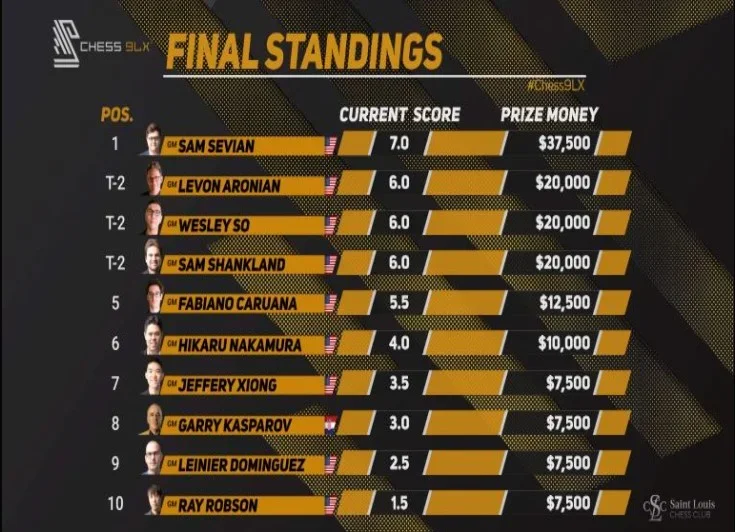
Categories
Archives
- December 2025 (25)
- November 2025 (29)
- October 2025 (39)
- September 2025 (27)
- August 2025 (29)
- July 2025 (43)
- June 2025 (25)
- May 2025 (24)
- April 2025 (29)
- March 2025 (29)
- February 2025 (20)
- January 2025 (24)
- December 2024 (34)
- November 2024 (18)
- October 2024 (35)
- September 2024 (23)
- August 2024 (27)
- July 2024 (44)
- June 2024 (27)
- May 2024 (31)
- April 2024 (51)
- March 2024 (34)
- February 2024 (25)
- January 2024 (26)
- December 2023 (29)
- November 2023 (26)
- October 2023 (37)
- September 2023 (27)
- August 2023 (37)
- July 2023 (47)
- June 2023 (33)
- May 2023 (37)
- April 2023 (45)
- March 2023 (37)
- February 2023 (28)
- January 2023 (31)
- December 2022 (23)
- November 2022 (32)
- October 2022 (31)
- September 2022 (19)
- August 2022 (39)
- July 2022 (32)
- June 2022 (35)
- May 2022 (21)
- April 2022 (31)
- March 2022 (33)
- February 2022 (21)
- January 2022 (27)
- December 2021 (36)
- November 2021 (34)
- October 2021 (25)
- September 2021 (25)
- August 2021 (41)
- July 2021 (36)
- June 2021 (29)
- May 2021 (29)
- April 2021 (31)
- March 2021 (33)
- February 2021 (28)
- January 2021 (29)
- December 2020 (38)
- November 2020 (40)
- October 2020 (41)
- September 2020 (35)
- August 2020 (38)
- July 2020 (36)
- June 2020 (46)
- May 2020 (42)
- April 2020 (37)
- March 2020 (60)
- February 2020 (38)
- January 2020 (45)
- December 2019 (34)
- November 2019 (35)
- October 2019 (42)
- September 2019 (45)
- August 2019 (56)
- July 2019 (44)
- June 2019 (35)
- May 2019 (40)
- April 2019 (48)
- March 2019 (61)
- February 2019 (39)
- January 2019 (30)
- December 2018 (29)
- November 2018 (51)
- October 2018 (45)
- September 2018 (29)
- August 2018 (49)
- July 2018 (35)
- June 2018 (31)
- May 2018 (39)
- April 2018 (31)
- March 2018 (26)
- February 2018 (33)
- January 2018 (30)
- December 2017 (26)
- November 2017 (24)
- October 2017 (30)
- September 2017 (30)
- August 2017 (31)
- July 2017 (28)
- June 2017 (32)
- May 2017 (26)
- April 2017 (37)
- March 2017 (28)
- February 2017 (30)
- January 2017 (27)
- December 2016 (29)
- November 2016 (24)
- October 2016 (32)
- September 2016 (31)
- August 2016 (27)
- July 2016 (24)
- June 2016 (26)
- May 2016 (19)
- April 2016 (30)
- March 2016 (36)
- February 2016 (28)
- January 2016 (32)
- December 2015 (26)
- November 2015 (23)
- October 2015 (16)
- September 2015 (28)
- August 2015 (28)
- July 2015 (6)
- June 2015 (1)
- May 2015 (2)
- April 2015 (1)
- February 2015 (3)
- January 2015 (1)
- December 2014 (1)
- July 2010 (1)
- October 1991 (1)
- August 1989 (1)
- January 1988 (1)
- December 1983 (1)







